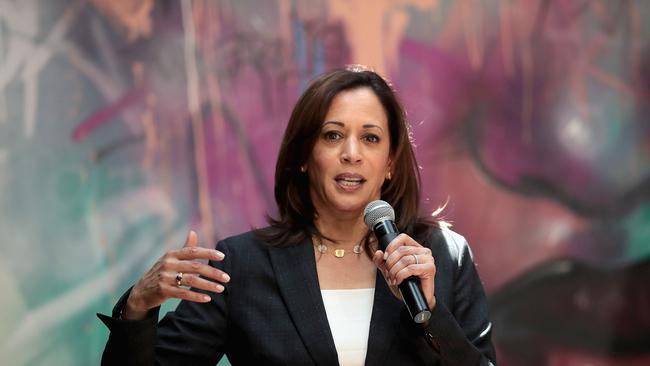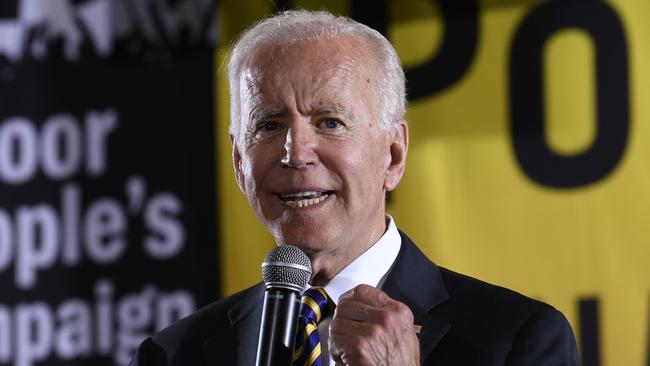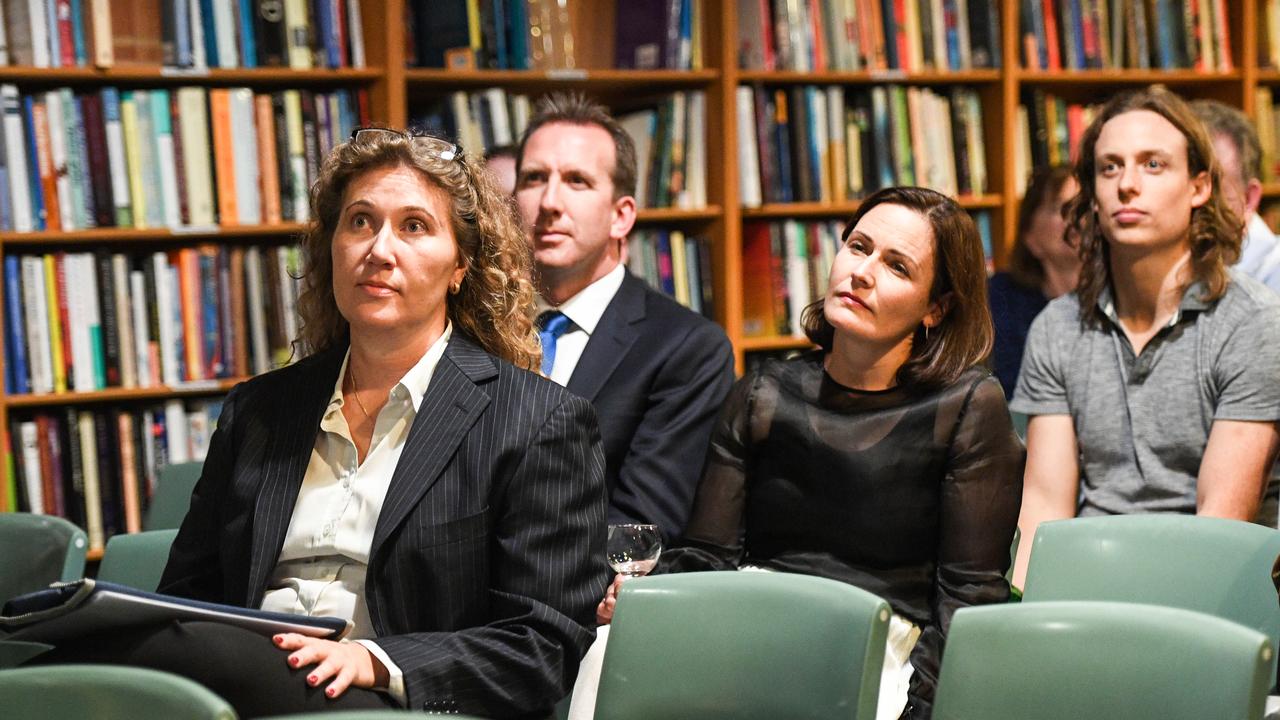First debate for Biden, Sanders and other Democrats
For some of the 25 Democratic presidential contenders, today’s first televised debate will be their make-or-break moment.

It will be the political version of speed dating as each candidate gets barely 10 minutes to tell Americans why they should be president.
But for some of the 25 Democratic presidential contenders, today’s first televised debate of the campaign will be their make-or-break moment.
For the first time Americans will be watching in large numbers to learn about, and judge, the disparate group of Democratic wannabes who are fighting for their party’s nomination to take on President Donald Trump in next year’s election.
They will see frontrunners Joe Biden and Bernie Sanders standing alongside long-shot candidates such as self-help guru Marianne Williamson and former tech executive Andrew Yang.
A chance for long shots
The long-shot candidates who have barely 1 per cent of voter support will have only a brief moment to say something that will catapult them into the public imagination. Otherwise they are likely to bow out even before the first Democratic primary is held next February.
“Your biggest goal has to be to be likeable and acceptable,” says former Republican house Speaker Newt Gingrich, who predicts candidates will have the chance to get only “two, or at most three, memorable one-liners out”.
But the debate also will be the most important moment yet for the frontrunners — Biden, Sanders, Elizabeth Warren and Kamala Harris — who will be looking to cement themselves as viable contenders for their party’s nomination.

Trump is watching
Watching the spectacle will be Trump, who reportedly plans to live-tweet his impressions of the Democrats as they make their case to the nation.
Such is the size of the record Democratic field that the debate is split across two nights, with 10 candidates debating at 11am today (AEST) and a further 10 debating tomorrow. Another four candidates — Montana Governor Steve Bullock; congressman Seth Moulton; Miramar, Florida, mayor Wayne Messam; and former senator Mike Gravel — did not win enough voter or donation support to qualify for these first debates.
Former Pennsylvania congressman Joe Sestak announced only on Sunday that he is running for the presidential nomination.
Names were drawn randomly to decide which 10 contenders would debate on which night, but the outcome was decidedly lopsided. The second debate (tomorrow at 11am AEST) has most of the heavyweight contenders in Biden, Sanders, Harris and Pete Buttigieg.
The only prominent contender in the first debate is Warren, although it does include potentially competitive candidates such as former Texas congressman Beto O’Rourke, New Jersey senator Cory Booker and Minnesota senator Amy Klobuchar.
Biden in front
Although there are wide variations between polls comparing the Democratic Party candidates, trends show Biden, 76, is comfortably ahead of the field, with Sanders, 77, and Warren, 70, vying for second place.
According to a Monmouth University poll last week, Biden’s support among Democrats is 32 per cent (down from 33 per cent last month), while Warren has jumped to 15 per cent (from 10 per cent), with Sanders on 14 per cent (from 15 per cent). Then comes Harris on 8 per cent (from 11 per cent), Buttigieg on 5 per cent (from 6 per cent) and O’Rourke on 3 per cent (from 4 per cent).
All the other candidates are polling at less than 2 per cent and in many cases less than 1 per cent. The debates will be the first chance for many Americans to focus on the Democratic race, so they have the potential to reshape the polls.
Biden’s rivals are hoping his early lead is mostly due to his universal name recognition and that his support will fade as voters learn more about other candidates.
Because Biden leads by so much, he has been able to conduct his campaign on his own terms by staying away from his rivals and directing his attacks squarely at the President.
This debate will be the first occasion on which Biden shares the stage with his rivals.
He has campaigned as the anti-Trump — the centrist, establishment candidate who promises to restore normality and civility to US politics after four wild years.
Biden’s message is that after eight years as Barack Obama’s vice-president and 36 years in the Senate, he is the best qualified Democrat.
“Who is most able to beat Trump?” he asked voters in Iowa. “Because if that doesn’t happen, nothing changes.”
Tension among contenders
But Biden also has some issues going into these first debates, having recently been embroiled in separate controversies over abortion funding and race comments.
Booker, one of three black Democratic candidates, last week clashed with Biden after the latter recalled his “civil” and productive working relationships with two segregationist and racist former senators.
“Vice-President Biden’s relationships with proud segregationists are not the model for how we make America a safer and more inclusive place for black people,” Booker responded.
Biden was seeking to make the point that he could work well with people even when he disagreed with their opinions. However, many saw his comments as being tone-deaf to contemporary views on race.
Many of the Democratic candidates also criticised Biden recently for his support for the Hyde Amendment, which for decades has prohibited the use of federal money to pay for abortions in most circumstances — a hot-button issue for Democrats.
Biden’s comments triggered an outcry from women and fellow Democrats before he suddenly reversed his position.
The backflip was welcomed by his party but also made him look flaky on policy. Once again, some Democrats wondered if he was out of touch with the mood of the party.
Younger Democratic contenders such as Buttigieg, 37, and O’Rourke, 46, will use this week’s debates to send a message of generational change, implying — if not outright stating — that Biden is yesterday’s man.
On the campaign trail, Buttigieg speaks of a vision that “doesn’t turn the clock back to the 1990s”. O’Rourke is more pointed, saying: “We cannot return to the past … you can’t go back to the Obama administration and think that that is good enough.”
Biden is also the only prominent centrist in the Democratic field and has refused to adopt a slew of left-wing positions that the other candidates have embraced, from universal healthcare to reparations for slavery and wealth taxes.
Biden argues that a moderate candidate is needed to win back the working-class voters Trump stole from the Democrats in 2016.
Warren’s rise
The most intriguing moment in the debates may be the performance of Warren, who has enjoyed the largest bounce in support of any of the Democrat during the past month.
Unlike the rest of the field, Warren has launched such a blizzard of detailed policies that her supporters have started wearing T-shirts saying: “I’ve Got a Plan For That”.
Warren has proposed left-of-centre policies on everything from affordable housing, higher taxation and abolition of student fees to anti-corruption measures, breaking up the tech giants, introducing universal healthcare and tackling the opioid crisis.
Although she has not explained how these multi-trillion-dollar plans would be funded, her populist appeal to progressive Democrats has caught the attention of the White House, which now considers her a potentially serious opponent.
Sanders is again proving to be popular after his strong showing against Hillary Clinton in 2016, but this time he is competing for left-wing votes in a crowded field with other liberal candidates such as Warren.
The Vermont senator, a self-proclaimed democratic socialist, is trying to broaden his image beyond that of a grumpy revolutionary into that of a warmer candidate who can relate to voters.
Harris, 54, a former prosecutor of Indian and Jamaican heritage, has been unable to build on her initial popularity but has the ability to garner large crowds with her progressive pitch. If a white man such as Biden or Sanders wins the nomination, Harris may be an attractive vice-presidential pick, given that she is a woman of colour, an important voting group for Democrats.
The debate also will introduce many Americans to the popular Buttigieg, who has intrigued the Democratic base with his unusual life story as a Harvard-educated Rhodes scholar who served in Afghanistan as naval intelligence officer, came out as gay, got married and became major of South Bend.
Although Americans were quicker than Australians to adopt same-sex marriage, it is unclear how conservative rural parts of the country would respond to a gay presidential candidate.
Beto’s battle
The final contender polling above 2 per cent is O’Rourke.
The Texan announced his run for the presidency in March with a bang, enjoying wall-to-wall media coverage as he jumped on tables in Iowa and spoke of his dreams for America.
But O’Rourke has struggled to gain traction. His plan to run an unorthodox campaign, speaking at small venues rather than large towns halls, saw him disappear from national view. He is now trying to change that. O’Rourke also has struggled from a lack of policies. He has failed to explain what he believes in. These debates will give him a chance to remedy that.
History shows that at this early stage, even those candidates whose support is languishing at 1 per cent have a chance to turn themselves into credible contenders before the Democratic national convention in July next year.
Bill Clinton averaged only 1.5 per cent of the vote in early polls in the 1992 campaign, while Jimmy Carter’s share of the vote was as low as 0.75 per cent at one stage in the 1976 campaign, before both men won their party’s nomination and then the presidency.
Klobuchar, who is polling at about 1 per cent, says there is a long race ahead and that anyone can still win.
“People will peak at different moments,” she says. “I’d rather peak closer to the election.”
Cameron Stewart is also US contributor for Sky News Australia.



